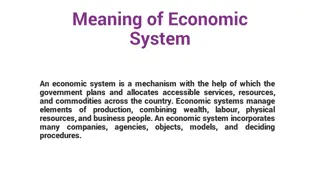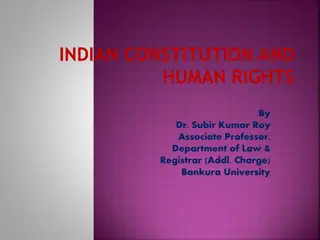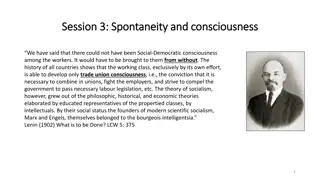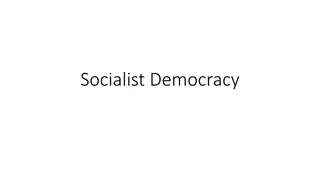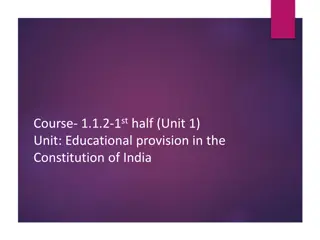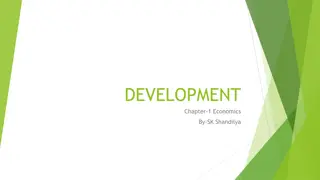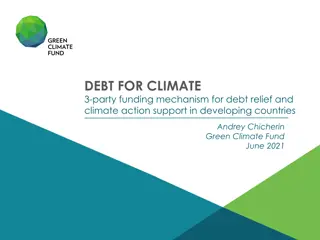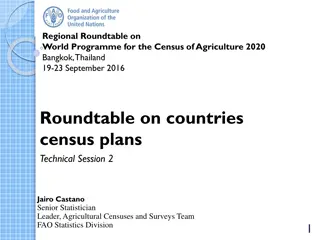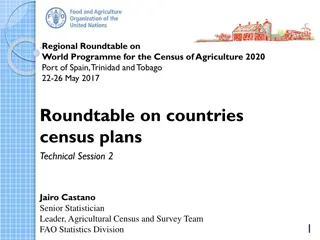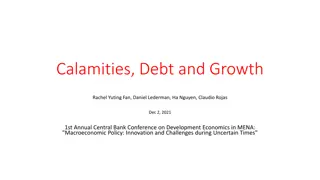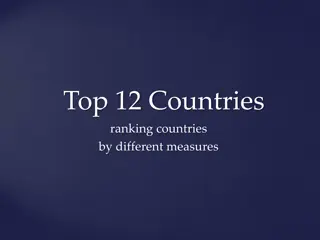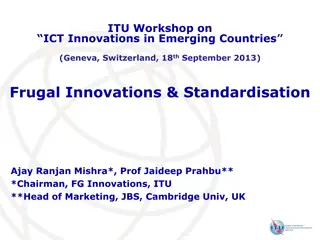Comprehensive Approach to Pre/Post-Operative Emergency Management
The provided content covers a case of a patient post right hemicolectomy with abdominal pain. Initial assessment and management plan are discussed, emphasizing the importance of targeted post-operative assessment and recognizing serious post-operative pain causes. Other potential complications and e
2 views • 22 slides
Post Matric Scholarship for OBC Students – Puducherry
How to get Post Matric Scholarship for Obc in Puducherry\n\nThe Post Matric Scholarship for OBC Students in Puducherry for the academic year, offered by the Ministry of Social Justice & Empowerment, Government of India, is an opportunity for students in the OBC category to pursue post-matric educati
0 views • 5 slides
Understanding Economic Systems and Sectors
An economic system is a mechanism through which the government plans and allocates resources and services. Types include capitalist, socialist, and mixed economies, each with distinct characteristics. The central problem of the economy is managing scarcity. The economic sector comprises the primary,
2 views • 5 slides
Exploring Responsibility and Social Change in 'Young and Old' Play
In the play "Young and Old," the characters Eric, Sheila, and Gerald represent the younger generation, while Arthur and Sybil symbolize the older generation. The story delves into the concept of responsibility, highlighting the different attitudes towards Eva's death. Arthur and Sybil, despite being
0 views • 9 slides
George Bernard Shaw: Influential Playwright and Social Critic
George Bernard Shaw, an Irish playwright, social critic, and political activist, is renowned for his witty language and social criticism in works like "Arms and the Man," "Pygmalion," and "Saint Joan." Shaw's influence on British socialist theory through Fabianism and his embodiment of realism in En
0 views • 25 slides
Indian Constitution and Human Rights: A Comprehensive Overview
The Indian constitution embodies justice in social, economic, and political spheres, aiming for the full development of every individual. Rooted in democratic principles and socialism, the preamble emphasizes liberty, equality, and justice. Drawing wisdom from leaders like Dr. Ambedkar and Mahatma G
0 views • 10 slides
The Role of Consciousness in Social-Democratic Thought
The development of socialist consciousness among the working class is discussed, emphasizing the need for outside influence to foster class and political awareness. Key figures such as Lenin and Kautsky are cited in their exploration of how consciousness is acquired and its significance in the labor
0 views • 6 slides
Contextual Evolution in J.B. Priestley's Play: An Inspector Calls
J.B. Priestley's play "An Inspector Calls" was set in 1912 but written in 1945, reflecting the significant changes in society between these years. Explore the context and events that influenced Priestley's work, showcasing his socialist views and the impact of historical events like WWI and WWII on
0 views • 12 slides
Features of China's 1982 Constitution
The 1982 Constitution of China, drafted after extensive discussions, adheres to socialist principles and emphasizes the socialist system as the foundation of the state. With a total of 138 Articles, it is a flexible document allowing for easy amendments and maintains a unitary system with centralize
2 views • 13 slides
Evolution of Companies and Global Business Impact
The presentation delves into the historical evolution of companies, from ancient multi-nationals to modern global corporations. It explores the intertwined relationships between economic expansion, colonialism, capitalism, and socialist movements. The presentation also discusses the role of companie
0 views • 20 slides
Understanding Socialist Democracy: A Political Ideology Explained
Socialist democracy is a political idea that combines elements of democracy and socialism, rejecting capitalism and authoritarian socialism. Proponents advocate for democratic decision-making and public ownership of the means of production. They believe in economic equality, government regulation of
1 views • 13 slides
Directive Principles of State Policy in the Indian Constitution
The Directive Principles of State Policy in the Indian Constitution provide guidelines for governance, focusing on social justice, economic welfare, and a just society. These principles are inspired by socialist ideology and aim at ensuring social and economic justice by minimizing inequalities, pro
2 views • 16 slides
Evolution of Parental Leave Policies in Bulgaria: A Historical Overview
Explore the transformation of parental leave policies in Bulgaria from the socialist era to the modern EU influence. The seminar delves into the progression of rights and entitlements for parents, inclusive of various family structures and dynamic societal needs. Key topics include paid parental lea
0 views • 18 slides
Role of Money in a Socialist Economy
Money in a socialist economy serves various essential functions such as a measure of value, medium of circulation, means of payment, accumulation, and distribution, along with providing monetary incentives and freedom of choice to individuals. It plays a crucial role in evaluating economic activity
0 views • 5 slides
Overview of Development Economics and Goals
Development economics is a branch of economics that focuses on improving the economies of developing countries by targeting factors such as health, education, working conditions, and policies. It involves macroeconomic and microeconomic analysis to enhance domestic and international growth. Differen
1 views • 11 slides
Building Socialism: Strategies for Social Change and Political Action
Explore the process of social change towards socialism through mass action, organization, and the building of a socialist party. Emphasizing the importance of campaigns, reforms, and transitional methods, the journey involves uniting the working class, challenging the capitalist system, and particip
4 views • 10 slides
Advancement of Social Work in Post-Soviet Countries Conference
The 4th Conference on Advancement of Social Work in Post-Soviet Countries discussed future strategies for social work education, emphasizing the importance of developing knowledge domains, educating social workers, providing services, research, and policy-making. It highlighted the interdisciplinary
0 views • 19 slides
Data Coops and Power Dispersal in Digital Society
Michele Loi from the Digital Society Initiative at the University of Zurich discusses the concept of data cooperatives and their role in distributing data power. These cooperative structures allow for democratic control over data management, emphasizing individual ownership and shared asset utilizat
0 views • 19 slides
Insights into Animal Farm: A Narrative of Betrayal and Manipulation
The narrative of Animal Farm encapsulates the evolution from an idealistic society to a manipulative regime, illustrating themes of betrayal, rule violations, manipulation, leadership exaggeration, harsh penalties, rumor spreading, forced labor, and emotional suppression within a communist-socialist
0 views • 10 slides
Global Economic Update: High-income Economies Accelerating, Developing Countries Facing Challenges
The global economic outlook presents a contrast between high-income economies accelerating in growth while developing countries encounter challenges due to headwinds and capacity constraints. Key messages highlight the need for structural reforms to enhance outcomes. Risks include fallout from the s
4 views • 34 slides
Small Countries' Resilience Against Center-Country Monetary Policies
Small countries should not fear the monetary and financial policies of larger center countries. This article discusses the potential spillovers of unconventional monetary policies by center countries, such as quantitative easing and negative nominal interest rates. It explores the concept of currenc
0 views • 39 slides
Three-Party Funding Mechanism for Debt Relief and Climate Action Support in Developing Countries
Developing countries require significant financial support to address climate vulnerabilities, surpassing current commitments from developed nations. A suggested three-party funding mechanism aims to facilitate ongoing funding for climate projects while providing debt relief to vulnerable countries,
0 views • 11 slides
Overview of Agricultural Census Participation in Asian Countries
This text highlights the participation of Asian countries in agricultural censuses during the World Programme for the Census of Agriculture (WCA) rounds in 2010 and planned for 2020. It provides insights into the countries that conducted agricultural censuses, their respective plans for the upcoming
0 views • 14 slides
Regional Roundtable on World Programme for the Census of Agriculture 2020
The Regional Roundtable held in Port of Spain, Trinidad and Tobago in May 2017 focused on countries' census plans for the World Programme for the Census of Agriculture. The event discussed participation statistics, census rounds, and the status of FAO Caribbean countries in conducting agricultural c
0 views • 13 slides
Opportunities for Israeli Businesses in the Environmental Goods Sector Post-Paris Agreement
Tel Aviv conference discusses post-Paris opportunities for Israeli businesses in the environmental goods sector. ClimaSouth initiative supports Mediterranean countries in transitioning to low carbon development and climate resilience. Key provisions of the Paris Agreement highlighted, including glob
0 views • 19 slides
Evaluation of UNDP Support to Conflict-Affected Countries in Integrated Peace Operations
This evaluation conducted by the Evaluation Office of UNDP in May 2013 assesses how UNDP's programming supports peacebuilding in conflict-affected countries. It focuses on UNDP's role in transitioning countries from immediate post-conflict to development stages and evaluates the effectiveness of res
0 views • 12 slides
The Rise of Adolf Hitler and the Nazi Party: A Historical Overview
Adolf Hitler, born in Austria in 1889, faced rejection as a painter before turning to politics. He led the National Socialist German Workers Party (Nazi) and orchestrated the failed Beer Hall Putsch in 1923. Imprisoned briefly, he penned Mein Kampf that propagated Nazi ideology. By 1932, the Nazi Pa
0 views • 15 slides
Rise of Mussolini in Italy and Weaknesses of the Liberal Monarchy
The historical timeline of Italy before 1919 led to Mussolini's rise to power through various events such as his involvement with the Italian Socialist Party and the formation of the Fascio di Combattimento. Italy's Liberal Monarchy faced weaknesses, including political divisions between progressive
0 views • 35 slides
Overview of Digital Switchover Plan in SATRC Countries
The study discusses the importance and necessity of Digital Switchover (DSO) in SATRC countries, highlighting the transition from analogue to digital TV and radio. It covers the global trends in digital broadcasting standards, the status of DSO in various countries like India, and the need for harmo
0 views • 16 slides
Election of 1912 and Its Impact on APUSH Students
Explore the dynamic Election of 1912 in US history, featuring William Howard Taft, Theodore Roosevelt, Woodrow Wilson, and Eugene Debs. Learn about the split in the Republican Party, Wilson's victory, Debs' Socialist impact, and the rise of the Progressive Party. Subscribe for more educational conte
0 views • 5 slides
Understanding Public Debt and Economic Growth in Developing Countries Amid Calamities
This paper explores the relationship between public debt, economic growth, and calamities like natural disasters, conflicts, and external debt distress in developing countries. Findings show that public debt tends to rise for economic recovery post-disasters, with growth accelerating beyond initial
0 views • 11 slides
Rental Sector Trends and Policy Evolution in Slovenia and Serbia
Explore the evolution of the rental sector in Slovenia and Serbia, from the socialist order to privatization and the current challenges faced in providing social housing. Key events, documents, and legislative acts have shaped the rental landscape in these transition countries, impacting ownership r
0 views • 16 slides
Rental Tenures in Slovenia: Insights from Post-Socialist Countries
Slovenia exhibits a unique tenure structure with a high percentage of home ownership and specific regulations governing rental tenures. The 2003 Housing Act defines various rental types, including non-profit and market-based rentals, while legislation outlines rules on contracts, rent regulation, an
0 views • 13 slides
Comparative Study of Sales Tax on Services in Various Countries
This content provides information on the scope and implementation of sales tax on services in different countries like Pakistan, India, Australia, Canada, France, Japan, and Malaysia. It highlights the VAT/GST regimes across the globe, the number of countries implementing VAT/GST by region, and coun
0 views • 55 slides
Economic Transition in Post-Communist Countries: A Quarter Century Review
This presentation by Oleh Havrylyshyn explores the progress and performance of post-communist economies since the fall of the Berlin Wall in 1989. It compares different countries' approaches to marketization, privatization, economic performance, and political transformation. The analysis highlights
1 views • 28 slides
Factors Influencing COVID-19 Magnitude in Developing Countries: African Specificity
An exploration of factors influencing the magnitude of COVID-19 in developing countries, with a focus on any African specificity. The study uses diverse data from various developing countries to investigate the impact of demographic, economic, social service access, environmental, climatic, and heal
0 views • 16 slides
Exploring the Top 12 Countries by Size, Population, and Economy
Unveil the top 12 largest countries in the world based on various measures like size, population, and economy. Discover why some large countries are not among the most populous or economically strong. Delve into the relationship between wealth, size, and population in these countries.
0 views • 9 slides
Impact of Standardization on Economic Growth in Emerging Countries
Standardization plays a crucial role in the economic growth of emerging countries by contributing significantly to GDP growth and labor productivity. Case studies from countries like Germany, UK, Canada, and Australia highlight the positive impact of standards on innovation and overall economic perf
0 views • 8 slides
Soviet Socialist Realism: Artistic Representation of Revolutionary Development
Socialist Realism emerged as the fundamental method of Soviet literature and art, emphasizing truthful and historically concrete depictions of reality within a revolutionary context. It required artists to engage in ideological transformation and educate the masses in the spirit of socialism. This a
0 views • 21 slides
Safflower: Overview of Cultivation, Climate, and Global Scenario
Safflower, scientifically known as Carthamus tinctorius L., is a versatile oilseed crop cultivated in various countries. The plant is characterized by its thistle-like appearance, branching structure, and cross-pollination nature. Safflower is adaptable to different climates, preferring drier areas
0 views • 29 slides


